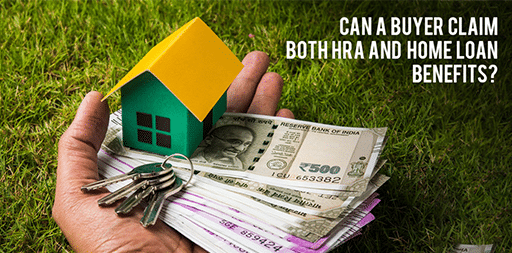The answer to that is yes. House Rent Allowance is a fixed amount of money segregated as a part of your salary by your employer for the accommodation you may have rented out. It’s a measure to aid in tax savings.
As a buyer, income tax exemption on both house rent allowance (HRA) and repayment of home loan can be claimed. If the house you are living in is on rent and need a home loan for another property, you can claim tax benefit for both. This is applicable even if both of the properties are located in the same city. Although, such cases are closely looked into by the Income Tax Department particularly when the amount is relatively higher. They may also disallow one of the claims if you fail to provide sufficient explanations.
However, you are in the clear in the following cases,
● If you have moved from a rented house to your own during the year or vice versa
● If you own a house that is smaller in size and your tenant rented a bigger property
● If the children of the person are studying in the locality of the rented house and during the year and were unable to change the school and consequently, he/she was not able to move to the new house bought.
However, some other cases, the Income Tax Department may question the tax exemption taken on both HRA and home loan.
The income tax laws grant you to claim various tax benefits, with regards to the house occupied by the assessee irrespective if it is owned by you or taken on rent.
The tax benefit of house rent allowance (HRA) is available to those with a fixed salary, those who receive HRA from his or her employer. So, a self-employed person or a salaried person who does not receive any HRA do not fall under these benefits. To avail of the HRA benefit, you must be paying rent for a housing property which is occupied by you. The benefit of HRA is not applicable for rent paid if it is occupied by someone else. It’s only available for properties taken on rent in the city where you primarily work.
It is also not available, where the accommodation is either jointly or fully owned by the assessee himself. So, if you, an employee let out a property owned by you to your employer and the employer, in turn, rents out the same to the employee and collects some rent on this account, the HRA benefit cannot be claimed. Likewise, if an employee is a joint owner of a property and pays some rent to the other joint owner/s of the property, HRA benefits will not hold good.
Conditions for claiming tax benefits on home loans
The first condition under Section 80C and deduction of interest under Section 24(b) for a home loan is that you must be the owner of the property. You cannot become the owner of the property if you failed to obtain possession of the same. So, this benefit cannot be claimed for an under construction property, till the project is completed and full possession is taken.
Tax benefit for principal repayment is available if the home loan is taken from the particular person and for a residential house only. However, interest benefits are available on both residential and commercial properties. For self-occupied house property, the benefit on interest is restricted to Rs two lakhs per year. If you own more than one house and the same are self- occupied, then, the other house/s are treated to be let out and notional market rent is required to be offered, for tax.
The benefit should be claimed only in genuine cases and not for the purpose of tax evasion. So, in case you have let out your own house and receive the rent in cash and are living on rent, it is highly recommended that you refrain from exploiting the provisions of the law in order to evade your duties towards the government.
Claiming HRA as well as home loan benefits
The law allows a taxpayer to own more than one house property. Nevertheless, the person has to opt for only one property as self-occupied. In any case, if more than one such property is found to be genuinely self-occupied then the law, considers that the person can have more than one self-occupied property, which is owned by him. By the same legal provision, it can further be inferred that one can have more than one property in his occupation, irrespective of its ownership.
So, in addition to the rented house occupied by the taxpayer, he can have one more house property as self-occupied.
So, you can claim both the benefits if your house is let out and you declare the rent in your ITR and are dutifully paying rent for another accommodation.

